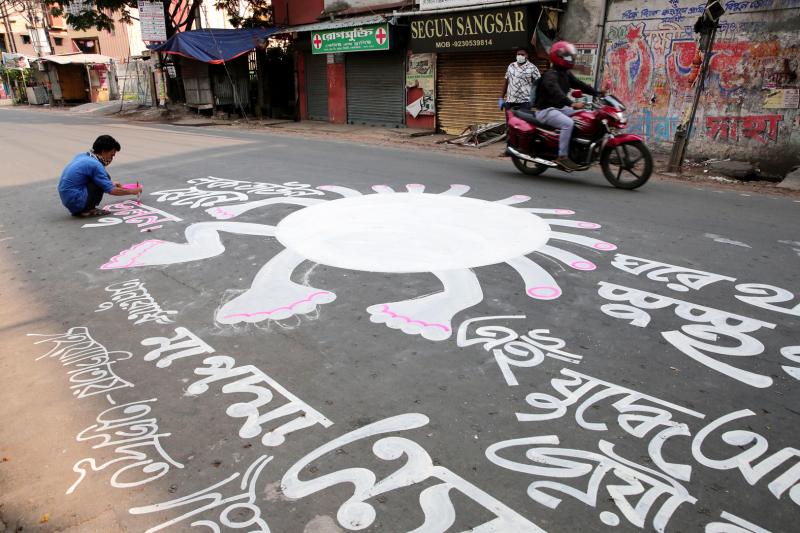In an air-conditioned government building in Mumbai, a dozen officials are glued to a giant screen showing live drone and CCTV footage of crowded slums, the front line in the city’s battle to contain the spread of COVID-19.
When cameras captured dozens of shoppers thronging a market in Mumbai’s low-income Dongri area last week, violating the nationwide lockdown begun on March 25, officials called in the police to disperse the crowd.
Twenty minutes later, the footage from Dongri showed only a handful of people still milling around.

Photo: EPA-EFE
To help enforce a lockdown in what is one of the most densely populated areas on earth, authorities are using drones, re-oriented traffic cameras and heat maps, but these can fall short when it comes to maze-like slum alleys.
“Hundreds will fall through the cracks, thousands, but as long as it is not in millions we are safe,” Praveen Pardeshi, who heads the city’s main civic body, said in an interview.
Mumbai is home to about 12 million people, of which about 65 percent live in slums. A further 6 million people are estimated to live in peripheral districts.
Confirmed cases in the city have ticked up above 1,900, including 113 deaths, making up about 15 percent of India’s more than 12,000 known cases.
Mumbai’s Dharavi, often considered Asia’s biggest slum with an estimated 1 million residents, has reported 71 cases and experts fear the number could climb quickly.
Authorities said that part of Mumbai’s high rates stem from more aggressive testing. The city has conducted 2,374 tests per million, versus 448 per million in the capital, New Delhi, a Mumbai government report reviewed by Reuters on Thursday said.
About 82 percent of coronavirus patients in Mumbai are stable, with just 2 percent requiring critical care, the data showed.
“If this percentage remains of stable cases, then we are through,” Pardeshi said.
Authorities have cordoned off parts of the slums, set up special fever clinics and created massive quarantine centers in a stadium and empty government buildings.
However, the restrictions are hard to observe when living at such close quarter. On a recent afternoon in a narrow passage encumbered by goats and electrical wire, police officers pleaded with a dozen Dharavi residents to go home.
Asif Siddiqui, a construction shop worker who lives in a one-room apartment with six family members, stayed put.
“They ask us to keep 1m distance, but my home is 2m long. We are trying to cooperate, but it is impossible to stay home in a place like this,” Siddiqui said.

PRECARIOUS RELATIONS: Commentators in Saudi Arabia accuse the UAE of growing too bold, backing forces at odds with Saudi interests in various conflicts A Saudi Arabian media campaign targeting the United Arab Emirates (UAE) has deepened the Gulf’s worst row in years, stoking fears of a damaging fall-out in the financial heart of the Middle East. Fiery accusations of rights abuses and betrayal have circulated for weeks in state-run and social media after a brief conflict in Yemen, where Saudi airstrikes quelled an offensive by UAE-backed separatists. The United Arab Emirates is “investing in chaos and supporting secessionists” from Libya to Yemen and the Horn of Africa, Saudi Arabia’s al-Ekhbariya TV charged in a report this week. Such invective has been unheard of

US President Donald Trump on Saturday warned Canada that if it concludes a trade deal with China, he would impose a 100 percent tariff on all goods coming over the border. Relations between the US and its northern neighbor have been rocky since Trump returned to the White House a year ago, with spats over trade and Canadian Prime Minister Mark Carney decrying a “rupture” in the US-led global order. During a visit to Beijing earlier this month, Carney hailed a “new strategic partnership” with China that resulted in a “preliminary, but landmark trade agreement” to reduce tariffs — but

SCAM CLAMPDOWN: About 130 South Korean scam suspects have been sent home since October last year, and 60 more are still waiting for repatriation Dozens of South Koreans allegedly involved in online scams in Cambodia were yesterday returned to South Korea to face investigations in what was the largest group repatriation of Korean criminal suspects from abroad. The 73 South Korean suspects allegedly scammed fellow Koreans out of 48.6 billion won (US$33 million), South Korea said. Upon arrival in South Korea’s Incheon International Airport aboard a chartered plane, the suspects — 65 men and eight women — were sent to police stations. Local TV footage showed the suspects, in handcuffs and wearing masks, being escorted by police officers and boarding buses. They were among about 260 South

Chinese President Xi Jinping’s (習近平) purge of his most senior general is driven by his effort to both secure “total control” of his military and root out corruption, US Ambassador to China David Perdue said told Bloomberg Television yesterday. The probe into Zhang Youxia (張又俠), Xi’s second-in-command, announced over the weekend, is a “major development,” Perdue said, citing the family connections the vice chair of China’s apex military commission has with Xi. Chinese authorities said Zhang was being investigated for suspected serious discipline and law violations, without disclosing further details. “I take him at his word that there’s a corruption effort under